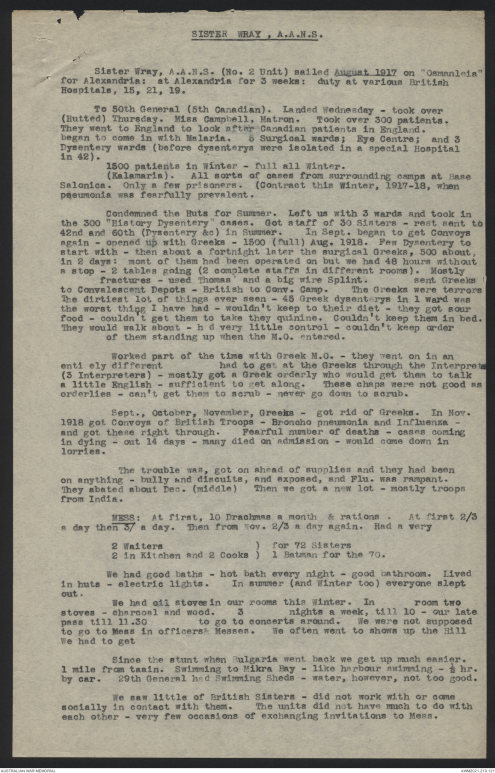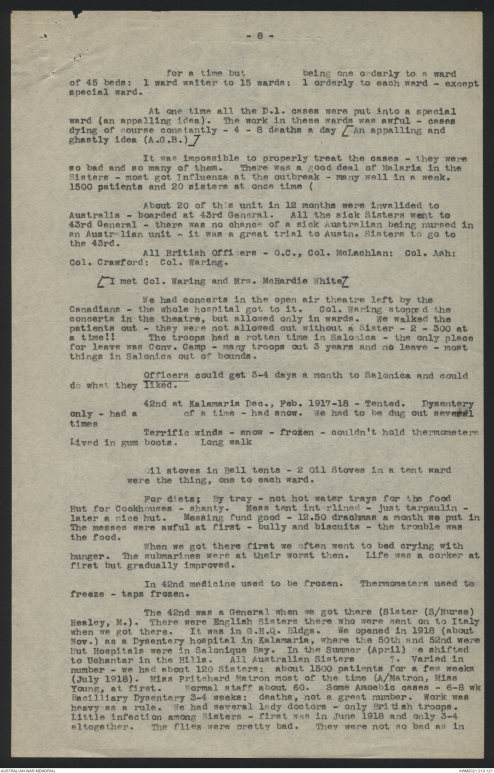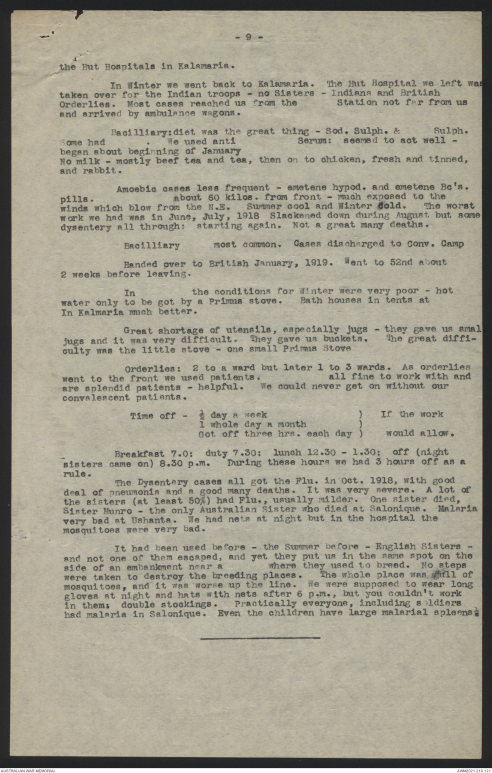AWM41 1062 - [Nurses Narratives] Sister Wray



SISTER WRAY, A.A.N.S.
Sister Wray, A.A.N.S. (No. 2 Unit) sailed August 1917 on "Osmanleia"
for Alexandria: at Alexandria for 3 weeks: duty at various British
Hospitals, 15, 21, 19.
To 50th General (5th Canadian). Landed Wednesday - took over
(Hutted) Thursday. Miss Campbell, Matron. Took over 300 patients.
They went to England to look after Canadian patients in England.
began to come in with Malaria. 5 Surgical wards; Eye Centre; and 3
Dysentery wards (before dysenterya were isolated in a special Hospital
in 42).
1500 patients in Winter - full all Winter.
(Kalamaria). All sorts of cases from surrounding camps at Base
Salonica. Only a few prisoners. (Contrast this Winter, 1917-18, when
pneumonia was fearfully prevalent.
Condemned the Huts for Summer. Left us with 3 wards and took in
the 300 "History Dysentery" cases. Got staff of 30 Sisters - rest sent to
42nd and 60th (Dysentery &c) in Summer. In Sept. began to get Convoys
again - opened up with Greeks - 1500 (full) Aug. 1918. Few Dysentery to
start with - then about a fortnight later the surgical Greeks, 500 about,
in 2 days: most of them had been operated on but we had 48 hours without
a stop - 2 tables going (2 complete staffs in different rooms). Mostly
fractures - used Thomas' and a big wire Splint. sent Greeks
to Convalescent Depots - British to Conv. Camp. The Greeks were terrors
The dirtiest lot of things ever seen - 45 Greek dysenterys in 1 ward was
the worst thing I have had - wouldn't keep to their diet - they got sour
food - couldn't get them to take they quinine. Couldn't keep them in bed.
They would walk about - h d very little control - couldn't keep order
of them standing up when the M.O. entered.
Worked part of the time with Greek M.O. - they went on in an
enti ely different had to get at the Greeks through the Interpreter
(3 Interpreters) - mostly got a Greeks orderly who would get them to talk
a little English - sufficient to get along. These chaps were not good as
orderlies - can't get them to scrub - never go down to scrub.
Sept., October, November, Greeks - got rid of Greeks. In Nov.
1918 got Convoys of British Troops - Broncho pneumonia and Influenza -
and got these right through. Fearful number of deaths - cases coming
in dying - out 14 days - many died on admission - would come down in
lorries.
The trouble was, got on ahead of supplies and they had been
on anything - bully and discuits, and exposed, and Flu. was rampant.
They abated about Dec. (middle) Then we got a new lot - mostly troops
from India.
MESS: At first, 10 Drachmas a month & rations. At first 2/3
a day then 3/ a day. Then from Nov. 2/3 a day again. Had a very
| 2 Waiters | ) for 72 Sisters |
| 2 in Kitchen and 2 Cooks | ) 1 Batman for the 70. |
We had good baths - hot bath every night - good bathroom. Lived
in huts - electric lights. In Summer (and in Winter too) everyone slept
out.
We had oil stoves in our rooms this Winter. In room two
stoves - charcoal and wood. 3 nights a week, till 10 - our late
pass till 11.30 to go to concerts around. We were not supposed
to go to Mess in officers Messes. We often went to shows up the Hill
We had to get
Since the stunt when Bulgaria went back we get up much easier.
1 mile from tanin. Swimming to Mikra Bay - like harbour swimming - ½ hr.
by car. 29th General had Swimming Sheds - water, however, not too good.
We saw little of British Sisters - did not work with or come
socially in contact with them. The units did not have much to do with
each other - very few occasions of exchanging invitations to Mess.
- 8 -
for a time but being one orderly to a ward
of 45 beds: 1 ward waiter to 15 wards: 1 orderly to each ward - except
special wards.
At one time aa the D.1. cases were put into a special
ward (an appalling idea). The work in these wards was awful - cases
dying of course constantly - 4 - 8 deaths a day [*[*]An appalling and
ghastly idea (A.G.B.)[*]*]
It was impossible to properly treat the cases - they were
so bad and so many of them. There was good deal of Malaria in the
Sisters - most got influenza at the outbreak - many well in a week.
1500 patient and 20 sisters at ince time (
About 20 of this unit in 12 months were invalided to
Australia - boarded at 43rd General. All the sick Sisters went to
43rd General - there was no chance of a sick Australian being nursed in
an Australian unit - it was a great trial to Austn. Sisters to go to
the 43rd.
[*[*]I met Col. Waring and Mrs, McHardie White[*Z*]
We had concerts in the open air theatre left by the
Canadians - the whole hospital got to it. Col. Waring stopped the
concerts in the theatre, but allowed only in wards. We walked the
patients out - they were not allowed out without a Sister - 2 - 300 at
a time!! The troops had a rotten time in Salonica - the only place
for leave was Conv. Camp - many troops out 3 years and no leave - most
things in Salonica out of bounds.
Officers could get 3-4 days a month to Salonica and could
do what they liked.
42nd at Kalamaria Dec., Feb. 1917-18 - Tented. Dysentery
only - had a of a time - had snow. We had to be duh out several
times
Terrific winds - snow - frozen - couldn't hold thermometers
Lived in gum boots. Long walk
Oil stoves in Bell tents - not hot water trays for the food
But for Cookhouses - shanty. Mess tent interlined - just tarpaulin -
later a nice hut. Messing fund good - 12.50 drachmas a month we put in
The messes were awful at first - bully and biscuits - the trouble was
the food.
When we got there first we often went to bed crying with
hunger. The submarines were at their worst then. Life was a corker at
first but gradually improved.
In 42nd medicine used to be frozen. Thermometers used to
freeze - taps frozen.
The 42nd was General when we got there (Sister (S/Nurse)
Mealey, M.). There were English Sisters there who were sent to Italy
when we got there. It was in G.H.Q. Bldgs. We opened in 1918 (about
Nov.) as a Dysentery Hospital in Kalamaria, where the 50th and 52nd were
But Hospitals were in Salonique Bay. In the Summer (April) we shifted
to Uchantar in the Hills, All Australian Sisters ?. Varied in
number - we had about 120 Sisters: about 1500 patients for a few weeks
)July 1918). Miss Pritchard Matron most of the time (A/Matron), Miss
Young, at first. Normal staff about 60. Some amoebic cases - 6-8 wk
Bacilliary Dysentery 3-4 weeks: deaths, not a great number. Work was
heavy as a rule. We had several lady doctors - only British troops.
Little infection among Sisters - first was in June 1918 and only 3-4
altogether. The flies were pretty bad. They were not a bad as in
- 9 -
the Hut Hospitals in Kalamaria.
In Winter we went back to Kalamaria. The Hut Hosptial we left was
taken over for the Indian troops - no Sisters - Indians and British
Orderlies. Most cases reached us from the Station not far from us
and arrived by ambulance wagons.
Bacilliary:diet was the geat thing - Sod. Suph. & Sulph.
Some had . We used anti Serum: seemed to act well -
began about the beginning of January.
No milk - mostly beef tea and tea, then on to chicken, fresh and tinned,
and rabbit.
Amoebic cases less frequent - emetane hypod. and emetene Bc's.
pills. about 60 kilos. from front - mush exposed to the
winds which blow from the N.E. Summer cool and Winter cold. The worst
work we had was in June, July, 1918 Slackened down during August but some
dysentery all through: starting again. Not a great many deaths.
Bacilliary most common. cases discharged to Conv. Camp
handed over to British January, 1919. Went to 52nd about
2 weeks before leaving.
In the conditions for Winter were very poor - hot
water only to be got by a Primus stove. Bath houses in tents at
In Kalamaria much better.
Great shortage of utensils, especially jugs - they gave us small
jugs and it was very difficult. They gave us buckets. The great difficulty
was the little stove - one small Primus stove.
Orderlies: 2 to a ward but later 1 to 3 wards. As orderlies
went to the front we used patients. all fine to work with and
are splendid patients - helpful. We could never get on without our
convalescent patients.
| Time off - | ½ day a week | ) if the work |
| 1 whole day a month | ) | |
| Got off three hrs. each day | ) would allow. |
Breakfast 7.0: duty 7.30: lunch 12.30 - 1.30: off (night
sisters came on) 8.30 p.m. During there hours we had 3 hours off as a
rule.
The dysentery cases all got the Flu. on Oct. 1918, with good
deal of pneumonia and a good many deaths. It was very severe. A lot of
the sisters (at least 50%) had Flu., usually milder. One sister died,
Sister Munro - the only Australian Sister who died at Solonique. Malaria
very bad at Ushanta. We had nets at night but in the hospital the
mosquitoes were very bad.
It had been used before - the Summer before - English Sisters -
and not one of then escaped, and yet they put us in the same spot on the
side of an embankment near a where they used to breed. No steps
were taken to destroy the breeding places. The whole place was gfullof
mosquitoes, and it was worse up the line. We were supposed to wear long
gloves at night and hats with nets after 6 p.m., but you couldn't work
in them: double stockings. Practically everyone, including soldier
had malaria in Salonique. Eventhe children have large malarial spleens [[?]]
 Sam scott
Sam scottThis transcription item is now locked to you for editing. To release the lock either Save your changes or Cancel.
This lock will be automatically released after 60 minutes of inactivity.